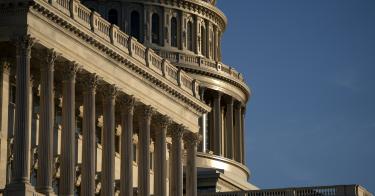Donald Trump, more than any president since Ronald Reagan, has demonstrated a commitment to our armed forces and the importance of peace through strength. Yet on Wednesday, he vetoed the annual National Defense Authorization Act (NDAA), which authorizes $740 billion in military spending.
The NDAA has been approved every year by Congress and presidents for decades. Why did Trump veto it, setting up attempts by the House and Senate to override his veto next week?
For one, the president wants the NDAA to include a repeal of Section 230 of the Communications Decency Act of 1996, which protects Internet platforms like Facebook and Twitter from legal liability for content posted by users.
Trump is right to demand Congress address the growing distrust over Big Tech companies that are managing online content with inconsistent policies that raise fears of censorship and political meddling.
But while there is a strong case to be made to reform Section 230, the NDAA is not to place to address it. The NDAA ought to focus on defense matters.
The president and many critics were absolutely right to complain about the many extraneous measures tacked on the COVID Relief Bill. Emergency measures ought to deal just with emergencies, not be a Christmas tree on which to hang every special interest wish and other unrelated matters. Stuffing monster bills like a turkey is just irresponsible governance—a reminder of everything bad about how Washington works.
But to be fair, in contrast to the COVID Relief Bill, the NDAA is one of the few bills that went through the regular order of crafting legislation just like the "how bills become law" explanations we read about in civics textbooks when we were in school.
This is how laws should get made. This process provides the maximum opportunity for transparency, debate and deliberation. The NDAA is the right way to make law. Congress ought to follow these practices more often, not less.
In the end, there is plenty in the NDAA that is critical to providing our armed forces the direction and authorities they need to provide for the common defense. Many of these provisions address critical needs, such as dealing with China.
For example, the NDAA contains a new Pacific Deterrence Initiative. This will enhance and focus the Pentagon’s efforts to counter China’s influence in the Indo-Pacific, as well as multiple new policy initiatives that will help the U.S. thwart China’s attempts to steal our technology.
In addition, the bill delivers equipment that our warfighters need, including an additional Virginia-class submarine and a new large-deck amphibious ship to replace the fire-stricken USS Bonhomme Richard. The bill also provides funding to build out the fleet of the world’s dominant fighter plane, the F-35.
The NDAA also addresses vital issues like cybersecurity. Seventeen of the congressionally directed bipartisan Cyber Solarium Commission’s recommendations in the bill will enable the government to better combat cyber threats. Considering the U.S. was just hammered by a major cyberhack, the need for implementing these measures is more than obvious.
Moreover, the NDAA would make the Pentagon a better steward of our tax dollars. It advances business reforms in how the Defense Department manages itself and its relationship with Congress. These are reforms that fiscally responsible hawks have been looking to enact for years, reflecting serious efforts by the Trump team to give Americans more bang for their buck.
The president, of course, has a constitutional right to veto legislation. He has exercised that authority and highlighted the administration’s concerns. But none of this changes our government’s responsibility for delivering the guidance and authority needed to continue to make "peace through strength" more than a motto. The responsibility remains for Washington to figure out how to get the job done.
The NDAA is arguably one of government’s singular most important responsibilities—and it is a job that never ends. Now more than ever, America can’t afford a time-out from providing for the common defense. We are faced with a rising China, a restive Russia, an aggressive Iran and a dangerous North Korea.
Efforts to improve military readiness and sustain the advances we’ve made in building better armed forces under Trump can’t stop now. We will need to continue that effort for years to come. Washington must meet this test and the ones surely to come.
This piece originally appeared in Fox News




